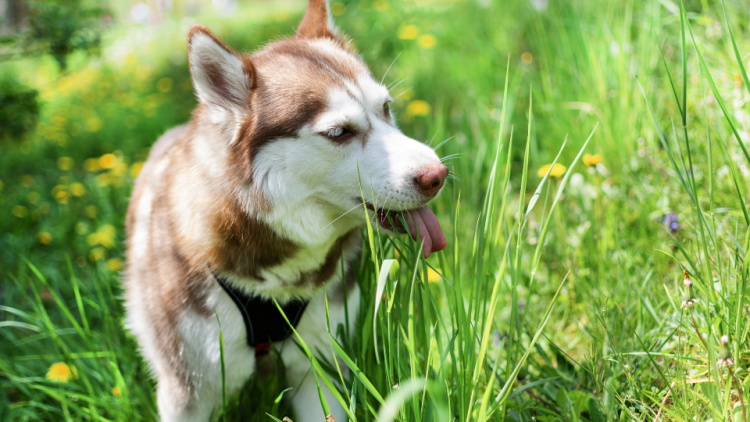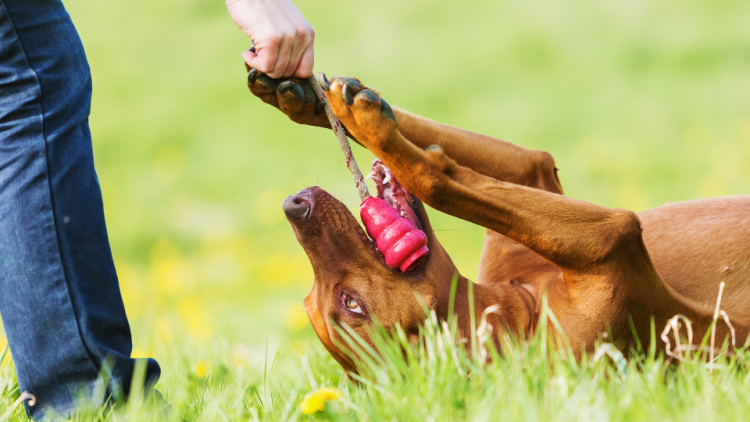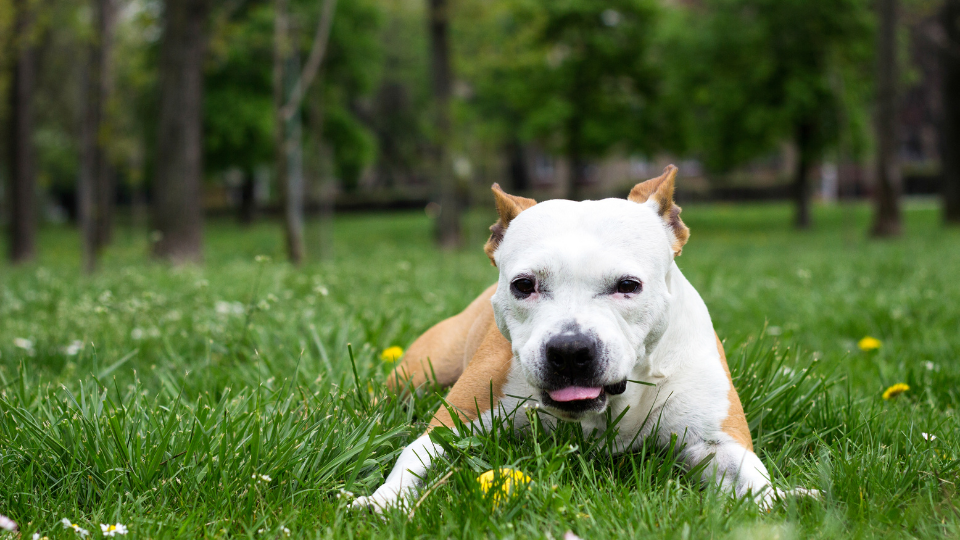Does your pup graze like a cow? Maybe they seem to enjoy a certain spot on the lawn? The behavior tends to vary, but most pet parents often wonder, “Why does my dog keep eating grass?”
In fact, study conducted at UC Davis, School of Veterinary Medicine, revealed that more than 2/3 owners (67%) say their dog eats grass on a weekly basis! But why do they do it? Contrary to popular belief, the answer may not be due to an upset stomach.
In this post, we’re sharing some of the most common psychological and physical reasons why dogs eat grass, when you should be concerned about the behavior, and what you can do to change it.
Table of Contents:
- Psychological Reasons Why Dogs Eat Grass
- Boredome
- Stress
- Taste
- Instinct
- Physical Reasons Why Dogs Eat Grass
- Stomach upset
- Nutritional deficiencies
- Can dogs eat grass?
- When to be concerned about grass eating?
- Should I stop my dog from eating grass?
- How to stop my dog from eating grass
- Key Takeaways
Pro Tip: Having pet insurance can help take the bite out of your next vet visit. However, it should be noted that pet insurance policies don’t cover treatment for pre-existing conditions. This means that if your dog showed signs of digestive distress before you signed them up for insurance, no treatments for digestive issues will be covered.
Psychological Reasons Why Dogs Eat Grass
Is your dog eating grass out of boredom?
Dogs are naturally active creatures who will easily get bored if not provided with enough activity. Oftentimes, they’ll start chewing on things (like socks) when they’re bored and need something to do. So, in many cases, your dog will eat grass just to pass the time—especially if you’re not around. In other cases, dogs might eat grass to attract your attention.
Is your dog eating grass due to stress or anxiety?
Another explanation for why dogs eat grass is due to stress, scared, or suffers from separation anxiety, eating grass might be their way of coping. Try to spend more time with your pet or leave items with your scent for them to smell when you’re away.
Is your dog eating grass because they like the taste?
Many dogs actually find grass quite tasty, especially if it’s young and tender. They might also like the texture of grass, which differs from that of canned food and kibble they usually consume.
Is your dog eating grass out of instinct?
One answer to the age-old question of why does my dog eat grass all the time is none other than instinct. Dogs are biologically predisposed to hunt and scavenge for food, just like their ancestors did back in the day. According to American Kennel Club, dogs are omnivores and the act of eating grass is something that comes naturally to them as part of their genetic makeup, dating back to when they hunted their own prey.

Physical Reasons Why Dogs Eat Grass
Is your dog eating grass to help with stomach upset?
Experts believe that our canine companions sometimes eat grass to induce vomiting and, as a result, alleviate stomach upset. This is also an evolutionary thing - when ancient wild dogs felt nauseous, they instinctively ate grass which irritated their stomachs and caused vomiting.
However, there is no scientific evidence for this claim and it’s actually difficult to tell whether the dog is throwing up from eating the grass, or they are throwing up because their stomach was upset and they thought the grass was going to help.
Is your dog eating grass to fill a nutritional deficiency?
The act of consuming objects that are not food (a condition known as pica) might be a sign of a nutritional gap in fiber, vitamins, or minerals. The habit of dogs eating grass fits into this theory as grass is rich in dietary fiber and eating it can help improve digestion.
However, dogs don’t always vomit after eating grass, which might mean that there is no real connection between these two activities. Some dogs might vomit because of the taste or texture of the grass, rather than for a digestive upset.
Pro Tip: Canine gastrointestinal issues can be tricky to catch and scary to deal with. Having the right pet insurance plan can make a significant difference, especially when a pet emergency catches you off guard. With pet insurance, you can worry about your pet instead of your wallet.
Is it OK for dogs to eat grass?
According to the aforementioned study above, fewer than 25% of dogs will actually vomit from eating grass and only about 10% of them show symptoms of illness prior to consuming it. So, it's very unlikely that most dogs eat grass because they are sick. It could be that dogs vomit because they ate grass, rather than the other way around, although there is no scientific evidence to support either side.
Additionally, this habit can result in intestinal parasites (like hookworms) that can easily be picked up from animal feces. Moreover, pesticides and herbicides sprayed on grass can be harmful to dogs upon consumption.
When to be concerned about my dog eating grass eating?
Get in touch with your veterinarian if your dog eats grass excessively or if they vomit repeatedly, more than just once, after grazing the ground.
It’s always best to speak to your vet if you think your pup has ingested too much grass or chemicals. If your dog is lethargic, has watery diarrhea, doesn’t eat their food, or shows other signs of stomach issues, they might have a problem that requires veterinary attention.
If your pet doesn’t show any symptoms, but you think that they might have eaten too much grass, keep them hydrated and have them fast for about eight to 12 hours before introducing food slowly.
Should I stop my dog from eating grass?
Yes. Even if dog seems to be eating grass simply because they like the taste and don’t vomit afterward, it doesn’t mean it is good for them. If the grass doesn’t come from your own lawn, you can’t say for sure whether it has been sprayed with pesticides and other toxic chemicals or whether it is contaminated with parasites that come from animal feces.

How to stop my dog from eating grass
If you suspect your pup is eating grass out of boredom, try to keep them busy. Engage them in some fun activities like tossing a Frisbee or Tug of War. Make sure they can entertain themselves while you’re out by investing in toys that don't need a pet parent involved, such as an electronic ball launcher.
If, on the other hand, you believe that this habit is caused by a nutritional deficiency, revise your pet's diet. Switching to high-fiber dog food might be helpful. If your pet seems to be eating grass for its texture and flavor, consider planting a low container of edible grass just for them.
Make sure that your lawn is dog-friendly. Don’t use herbicides and pesticides that contain harmful chemicals, or consider making a separated dog-safe space in your backyard. Clean up feces regularly to decrease the risk of parasitic infections. If you have foxtails, be sure to remove them. These grass-type weeds are found on many lawns and pose a serious risk to dogs.
Finally, always keep an eye on your pup while they are outside. Long, rigid blades of grass with sharp edges can easily scratch or cut your pet’s throat or esophagus. If your pup is coughing or showing other signs of irritation after eating grass, be sure to get in touch with your vet as soon as possible.
Train your pup to ignore grass. Consider bringing treats when you take them out for a walk and try to distract them when they’re eating grass by leading them gently in another direction. Or, use verbal cues like “drop” and "sit" and reward them with a treat when they comply.
Key Takeaways
- Many pet parents believe that grass-eating is a signal of illness but in reality, this habit is not always a cause for concern. Your dog probably eats grass simply because they like the taste.
- In some cases, grass-eating may be a result of boredom, so be sure that your dog has enough exercise and play during the day.
- Make sure that the grass your pup is munching on isn’t sprayed with any pesticides or other harmful chemicals.
- If your pet is repeatedly vomiting up grass and/or not eating their regular food, get in touch with your veterinarian.
